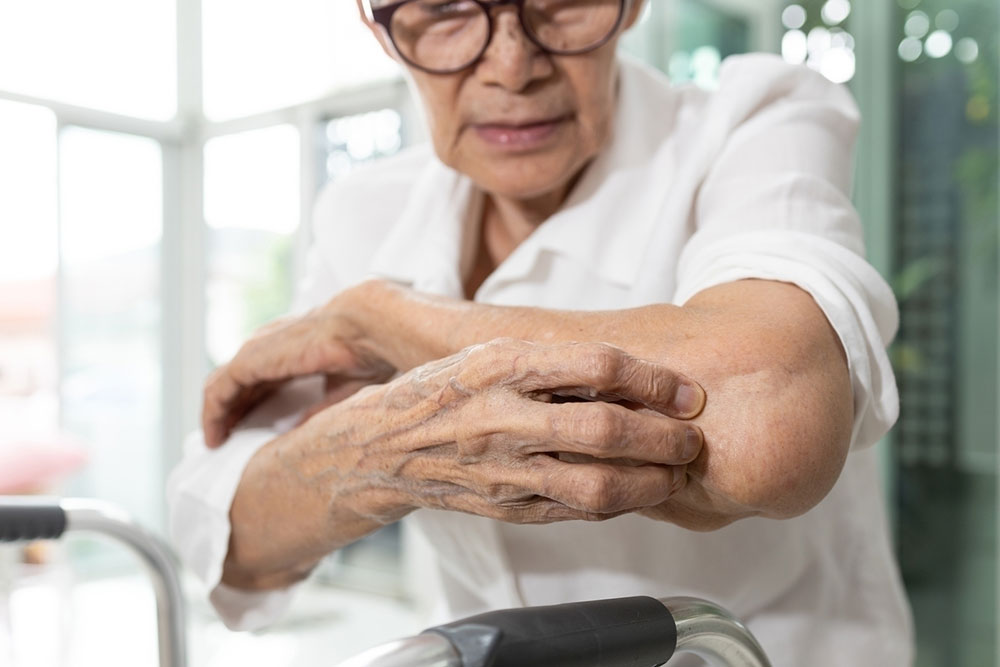Itchy Skin in Seniors – Causes, Symptoms, and Management
The skin starts to lose its natural barrier as one ages. It becomes drier and more prone to irritants like dust, germs, and bug bites, which can lead to increasingly itchy skin. Itching, often known as pruritus, can cause persistent discomfort and stress in seniors. In most cases, pruritus, or frequent bouts of itching, occur around the scalp, neck, ankles, and areas around the wrist.

Causes of itchy skin in seniors
Itchy skin is usually a symptom of another underlying issue, which can be external, such as tight clothing or the fabric of the bedding one uses. Other times, the issue can also be internal. For instance, seniors who are immunocompromised might be allergic to several things that can cause itchy skin. They must be aware of other causes as well.
- Dry skin
This is one of the most common causes of itchy skin in seniors. Dry skin usually occurs when the skin cannot retain its natural moisture, leading to a compromised skin barrier. Itching worsens during cold or hot weather, especially in places where humidity levels decrease. - Eczema
Eczema, also known as atopic dermatitis, is an autoimmune disorder. It is triggered when genetic conditions and immune system dysfunction cause gaps in the skin’s barrier. As a result, the skin’s natural moisture escapes, causing excessive dryness. Sometimes, fragrances and dust mites also get into the skin through inflammation. Also, it is not unusual for bacteria and viruses to get through the gaps to cause infection. All of these make the skin itchy. - Allergies
When the skin comes into direct contact with an allergen, it can trigger itchiness. This is known as allergic contact dermatitis. It usually happens when one touches clothing, chemicals, pets, chemicals, soaps, cosmetics, and poison ivy. Sometimes, foods such as shellfish and peanuts can also cause itchiness in the skin. - Hives
It is a type of skin inflammation that occurs when the body starts to release a chemical known as histamine. Because of this, small blood vessels start to leak, leading to swelling of the skin. As a result, one experiences intense itching, which can often be quite painful.
Symptoms of itchy skin
There are quite a few symptoms of itchy skin, and depending on what one is experiencing, one can learn how to manage them.
- Pain in the areas where itching occurs
- Inflamed skin that is warm or cold to touch
- Prominent bumps, spots, and blisters
- Red, itchy skin
- Noticeable scratch marks on the skin
- Leathery or scaly patches on the skin due to scratching
Managing itchy skin in seniors
Aging lowers the ability of the skin to fight off allergens and irritants. Because of this, many seniors often experience itchiness for weeks or days. The skin also becomes sensitive with age, making it prone to constant itchiness. Often, one gets trapped in a cycle of persistent scratching to get relief from the itch, which causes further discomfort and pain. The problem becomes worse, increasing the risk of infection.
But, there are several ways to manage and home remedies to try to alleviate symptoms associated with itching.
- Keep the skin hydrated
Using moisturizers and hydrating creams can help relieve irritation and dryness. This is because lotions and creams help lock moisture into the skin. As a result, there are fewer instances of scratching, which lowers the risk of the skin getting infected. Besides, keeping the hands well-moisturized can help prevent the skin from peeling and cracking further, preventing the condition from becoming worse. - Use paraffin wax
Dipping or slathering dry areas of the skin in paraffin wax is an effective way to manage itchiness. The layer of paraffin wax creates an artificial barrier that holds in moisture and keeps away irritants. It is particularly helpful for those experiencing constant skin itching due to psoriasis or eczema. But before using paraffin wax, make sure it is not too hot and is at a comfortable temperature. Otherwise, it can worsen the irritation and cause further inflammation. - Use gentle soaps and cleansers
Aging often makes the skin quite sensitive, increasing the incidence of itching. In such situations, using harsh soaps can only worsen the symptoms. Avoid such products; instead, use soaps and cleansers specifically made for sensitive and hypoallergenic skin. Besides this, avoid products that contain fragrances. These substances can cause further irritation. Products that are gentle on the skin will not strip away the natural oils and help retain moisture. - Apply cool compresses
A cold compress can be helpful when the itching is localized to only one skin area. It will relieve the scratching and soothe the irritation. In addition, applying a cool compress can also reduce any swelling or inflammation that might have occurred in the itchy part of the skin. One can buy cold compresses from a retail pharmacy or supermarket or make them at home. For a DIY compress, use a clean cloth dipped in cold water. Squeeze out the excess water and apply the cloth to the affected part of the skin. This will numb the itch and give temporary relief.











